Department of Agri-Food Business
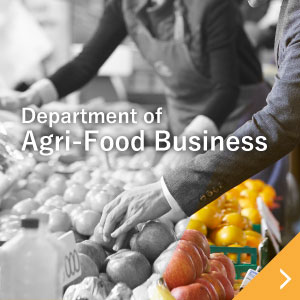
Exploring food and agriculture from economic and management perspectives.
By learning global and local agri-food systems in economic and management perspectives, through courses rich in both theoretical wisdom and hands-on experience, we will nurture students’ problem-solving skills that are broadly applicable to today’s globalizing society.
Key Points of Study
01Learn the diverse economic and business issues in today’s agri-food systems
Under the theme of “Agriculture” and “food” that are essential for human life and social activities, the students will learn how the food system works and what issues are included through basics to practical learning.
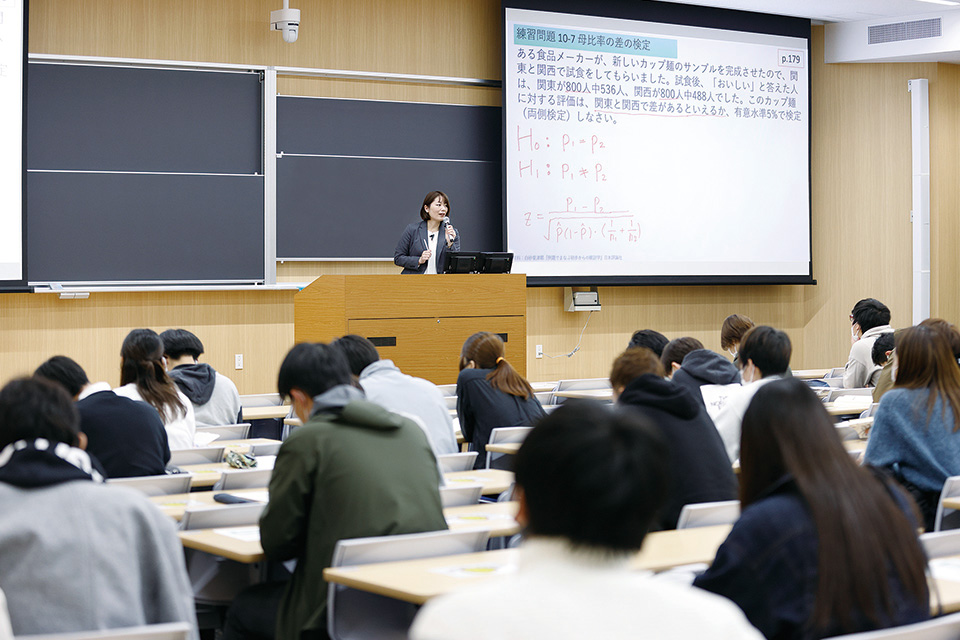
02Discover the challenges in agri-food systems and wisdoms that lead to solutions
To acquire the intelligence of problem discovering and solving, the students will be trained to look at the food production, processing, distribution and consumption from theoretical and practical sides.
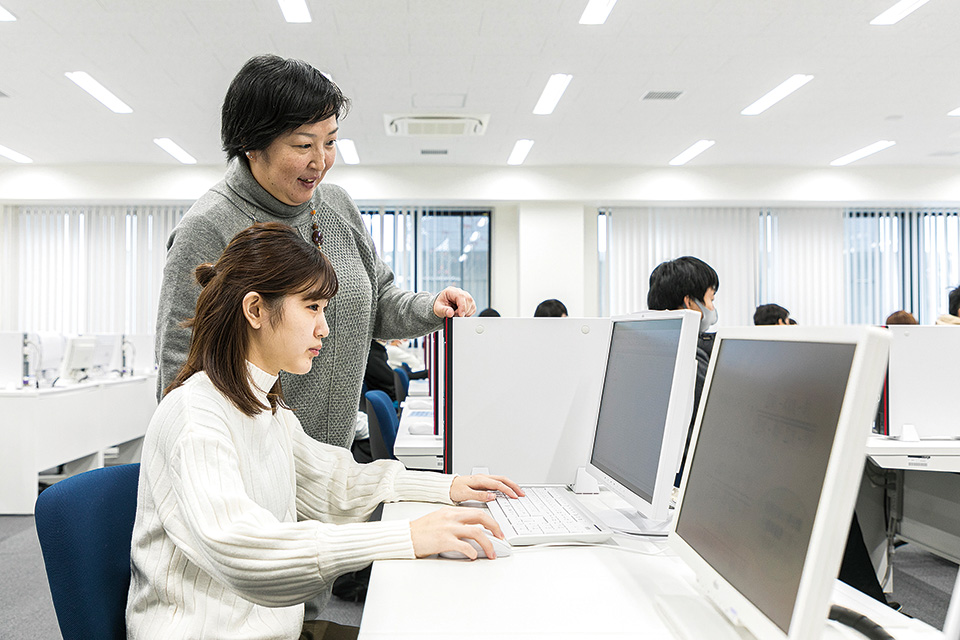
03Gain the practical problem-solving skills through courses rich in hands-on experience
To be active in both the local and international communities, the students will be prepared with expertise in economics, management, policy, food industry, distribution, marketing, etc. -a mind of global and local scope, and practical skills.
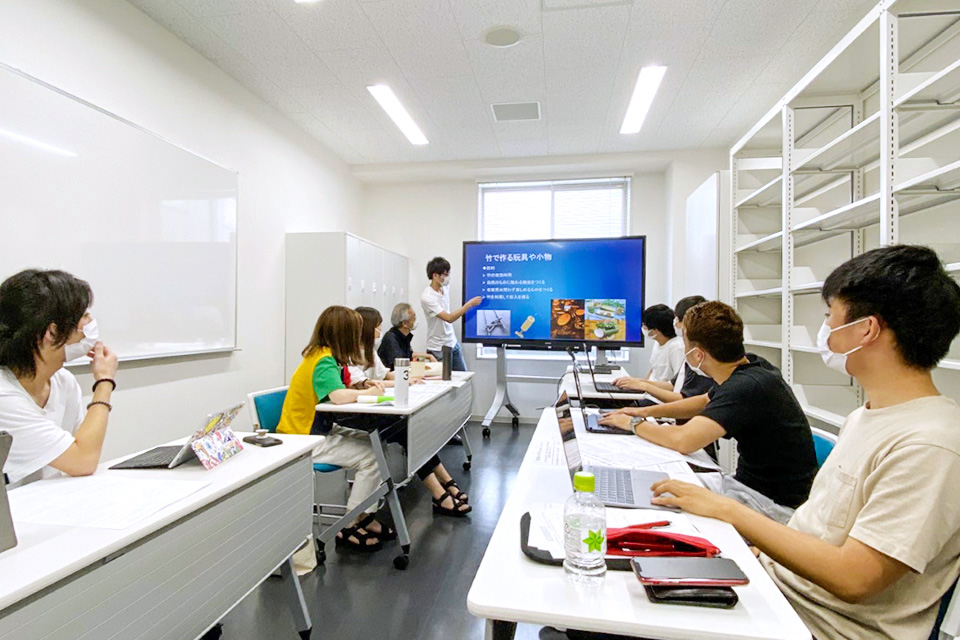
Curriculum
Students will learn about the production, processing, distribution, and consumption of agricultural products and foods through economics, management, marketing, etc. from dimensions of the international society as well as the local community.
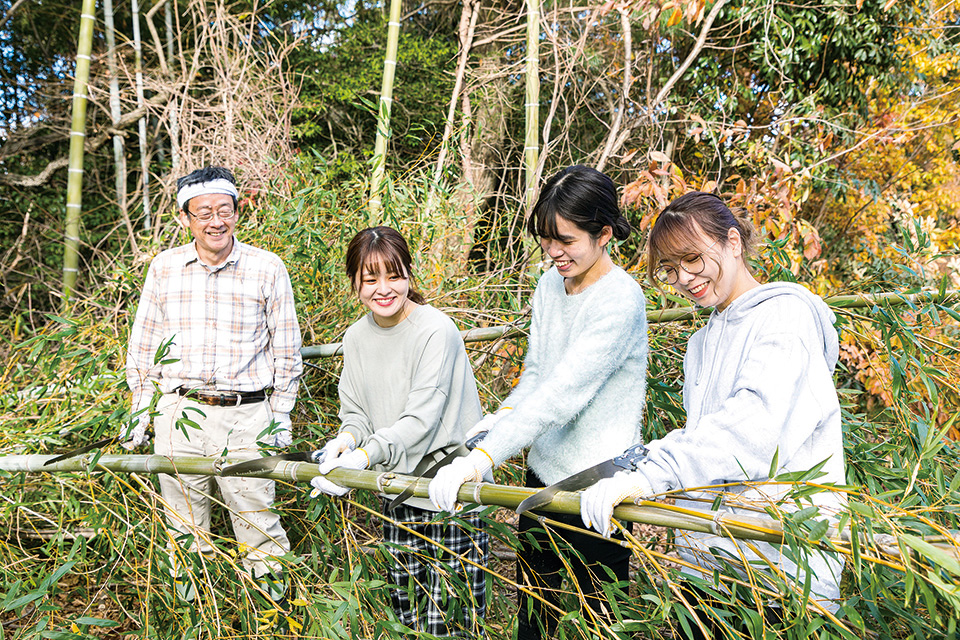
●Compulsory Courses
■Elective Compulsory Courses A
▲Elective Compulsory Courses A
Scroll left/right
| Year 1 | Year 2 | Year 3 | Year 4 | |||
|---|---|---|---|---|---|---|
| Specialty Subjects |
Common Courses |
●Introduction to Agriculture ●Basic Seminar in Agriculture |
Seminar in Global Agriculture | Seminar in Smart Agriculture Agricultural Meteorology |
Forest Ecology Agricultural Intellectual Property |
|
| Specialty Core Courses |
Fundamental Courses | ●Introduction to Agri-Food Business ●Food and Agricultural Ethics ●Basic Economics ●Agro-Ecology ●Basic Statistics ●Modern History of Food and Agriculture ●Microeconomics |
▲Macroeconomics | Elementary Bookkeeping Social Research Frontier of Agri-Food business |
||
| Agricultural Economics, Management and Policy Courses | ●Farm Business ▲Food and Agricultural Economics ▲Food, Agriculture and Rural Area Policy ▲Farm Business Management Sextiary Industry Management Rural Resource Management |
■Food and Agriculture Business Practice Rural Sociology Rural Environmental Economics |
||||
| Food Industry and Distribution Courses | ●Economics of Food System | ▲Food Industry ▲Food and Agricultural Market Distribution of Agricultural and Livestock Products Distribution and Marketing System of Fishery Products |
■Food Business Strategy Marketing of Agricultural and Fishery Products Food Labelling and Certification Female Entrepreneurship and Leadership |
|||
| Food and agriculture symbiosis and recycling-oriented agriculture Courses | ●Symbiosis of Food and Agriculture | ▲Issues in Sustainable Agriculture ▲Dietary and Agricultural Education Co-operatives Urban Agriculture |
■Rural Community Business Non-Profit Organizations Organic Agriculture |
|||
| International Agriculture Courses | ●Comparative Agriculture International Agricultural Economics |
Agricultural Development Modern Korean Agriculture Modern Chinese Agriculture |
||||
| Specialty Comprehensive Courses |
Agricultural Production Courses | Insects and Microbes Plant Breeding and Production Management Utilization and Production Fundamentals of Crops |
||||
| Applied Biology Courses | Biology of Plants Microbiology Biology of Animals |
|||||
| Food and Nutrition Courses | Food Safety Nutrition and Sports Health and Society |
|||||
| Seminars and graduation research | ●Freshman Seminar ●Basic Seminar of Agri-Food Business I |
●Basic Seminar of Agri-Food Business II ●Basic Seminar of Agri-Food Business III |
●Research of Agri-Food Business I ●Research of Agri-Food Business II |
●Graduation Research | ||
| General Education Subjects | Language Courses | Japanese Reading and Writing Basic English Ia Basic English Ib Basic English IIa Basic English IIb |
Practical English I Practical English II Chinese I Chinese II |
Basic English Conversation a Basic English Conversation b |
||
| Overseas Language Training | ||||||
| IT Courses | ●Information Literacy I Information Literacy II |
|||||
| Physical Education | Sports Science I Sports Science II |
|||||
| Cultural Studies | Psychology Ethics Philosophy Regional Geography Human Geography Literature |
Cultural Anthropology Women’s Studies |
||||
| Social Studies | Study of Volunteer Activity Introduction to Economics Japanese Politics Introduction to Jurisprudence Introduction to Management Tourism Studies |
Japanese Constitution | ||||
| Natural Sciences | ●Basic Biology Mathematics |
Life and Environment | Earth and Space Science Experiments in Earth Science |
|||
| Career | ●Career Design I | Career Design II Development of Mathematical Ability |
Basic Internship Practical Internship |
|||
| For International Students | Japanese Culture and Society FI Japanese Culture and Society FII Japanese Reading F Japanese Grammar F Japanese Reading and Writing F Comprehensive Japanese F Japanese for Specific Purposes F Japanese Conversation F |
|||||
| For Returning Students | Japanese Culture and Society RI Japanese Culture and Society RII Japanese Reading R Japanese Grammar R Japanese Reading and Writing R Comprehensive Japanese R Japanese for Specific Purposes R Japanese Conversation R |
|||||
Laboratories
With diverse expertise in social science, the faculty seek business and policy solutions for the challenges in today’s agri-food systems.
Some 12 faculty members are working in the department with diverse expertise in social science, each consisting independent laboratory, and are grouped into following three modules.
Department of Agri-Food Business
Department Head Toshikazu URADE
Agricultural Economics, Management and Policy
Laboratory of Farm Business
Noriaki KAWASAKI[Associate Professor]
Laboratory of Agricultural Policy
Kunihisa YOSHII[Professor]
Laboratory of Agricultural and Applied Economics
Christopher O. SUNG[Professor]
Laboratory of Rural Resource Management
Toshikazu URADE[Professor/Department Head]
Food Industry and Distribution
Laboratory of Food and Agricultural Marketing
Yutaka TANEICHI[Professor]
Laboratory of Food Industry
Naotoshi YAMAMOTO[Professor]
Laboratory of Food Marketing
Kumi SOEJIMA[Associate Professor]
Laboratory of Food Distribution
Jessy R. DAI[Lecturer]
Food-Agriculture Symbiosis and Closed Loop Agriculture
Laboratory of Agri-Food Symbiosis and Co-operatives
Taichi KITAGAWA[Professor]
Laboratory of Agro-Ecosystems Management
Ueru TANAKA[Professor]
Laboratory of Food and Agriculture Education
Kana NAKATSUKA[Associate Professor]
Laboratory of Sustainable Food System
Yoko TANIGUCHI[Associate Professor]
Laboratory of Farm Business
Increasingly diverse entities, including not only family-farm-based ventures but also corporations with non-farm origins and community farm enterprises, have emerged and spread across Japan’s agricultural sectors. These entities, which vary in organizational structures or business orientations thereby diversifying farming endeavors in rural areas, have demonstrated their significant potentials to alter existing structures of and surrounding Japan’s farm sectors.
Noriaki KAWASAKI[Associate Professor]
To understand roles of diverse organizations and institutions relevant to farm businesses
The pluri-sector-business endeavor combining agricultural production with processing/manufacturing and service businesses, also known as Rokuji-sangyo-ka, has been rapidly growing and impacting on rural economic dynamics. The abovementioned changes in farm sectors in transition urge us to renovate theoretical and practical designs for emerging entrepreneurial farming entities and for rural community revitalization. Thus, to arm students with foundational and practical insights in the topic, this laboratory addresses the basics of the governance and management of diverse farm entities and regional agri-food clusters and networks surrounding them.
Laboratory of Agricultural Policy
Laboratory of Agricultural and Applied Economics
Our primary research interests are economic theory, agricultural and applied economics. More specifically, we focus on the Fourth Industrial Revolution, solar photovoltaic farming, smart agriculture, Sixth Industrialization, basic income, the sharing economy, metaverse applications in farming, animal welfare, healing agriculture, Israel's economy and agriculture. Highly motivated students are always welcome to join our group.
Christopher O. SUNG[Professor]
Exploration of agricultural economics based on precise economic theory!
I study the various economic phenomena and issues that arise in the agriculture and food sector in relation to other sectors of the economic system. In other words, my main research interest is in agriculture as an industry and rural areas as a community, and I approach the various issues arising from these in an integrated manner from an economic perspective. I am also studying Metaverse, sharing economy, basic income, emissions trading, and biblical economics etc.
The Possibilities and Prospects of Farming Solar Photovoltaic by the PPA Model



Laboratory of Rural Resource Management
In rural areas, "Local production for local consumption" and "regional branding" are not necessarily linked to the promotion of local agriculture or regional revitalization, and they are facing difficulties in doing so.
We forcus on the effects of regional revitalization through local production and local consumption activities and regional branding.
Toshikazu URADE[Associate Professor]
"Rural resources" are essential for regional revitalization. The most typical rural resources are natural resources and landscapes, but other than that, everything that represents the uniqueness of a region can be considered a regional resource, such as food, traditional events, and traditional culture. However, rural resources are still not being utilized effectively. We work to discover rural resources and explore their effective utilization and appropriate management methods.
Laboratory of Food and Agricultural Marketing
Yutaka TANEICHI[Professor]
Laboratory of Food Industry
The food industry comprises various sizes and types of businesses, ranging from small family-owned processing and/or retailing businesses, such as salted and dried fish processing and fishmongers, to modern manufacturing operations managed by corporations, such as instant noodle and beer manufacturing. In this laboratory, we will explore the current significance of distribution and what it should involve by investigating and discussing market competition structures, business practices of distributors such as wholesalers and retailers, relationships among them, transaction-related problems, the public distribution system, and its legal reforms in Japan. We will especially focus on fresh food closely related to agriculture and fisheries production, as well as our household food consumption.
Naotoshi YAMAMOTO[Professor]
Explore what fresh food distribution in Japan should involve.
In order to evaluate the current significance of the wholesale market system, which represents the public distribution channel, I have been conducting analyses of transaction problems and relations among supermarkets that are currently leading price and deal negotiations and their vendors. This analysis is based on the strategic behavior of procurement and sales by supermarkets as the focal point. Additionally, I have planned to investigate how major amendments to the wholesale market law (neo-liberal reform, rationalization of intermediate distribution) impact existing distribution and transactions.
Food industry structure & its playersʼ behavior


Laboratory of Food Marketing
There is a significant decrease in the birthrate and an ageing, declining, population. Also, the number of foreigners visiting Japan is increasing. Other trends include an increasing number of working women in Japan coupled with changing attitudes towards having a family, a problem of income disparity, changing lifestyles and a diversification of values in Japan. There are many different ways of having a family.
Amongst all this, how do consumers view different products and choose products from agricultural, seafood and processed food.
In addition, what kind of marketing methods are producers, companies in the food industry, distributors, retailers etc. doing?
We focus our research on these new trends and aim to contribute to the creation of a sustainable agriculture, fisheries industry and society where people can enjoy a rich and varied diet.
Kumi SOEJIMA[Associate Professor]
Thinking about the world of food and agriculture through marketing
How would you choose food? The cheaper, the better? Would taste be most important? Safety? Convenience?
Recently, the demands of consumers regarding agricultural produce, seafood and processed food have become more varied. How should producers, distributors and consumer facing businesses market to these consumers? We will be linking up case studies and theory.
Agriculture, fisheries and consumption of food from women’s perspectives




Laboratory of Food Distribution
Distribution plays a role in filling the temporal, geographical, and social gaps in the production and consumption of food as a commodity. The distribution system is formed based on the social and economic conditions of each country and is changing with globalization. In this laboratory, we devote ourselves to finding out the mechanism and role of distribution by focusing on foods and agricultural products, which are essential for our daily lives, to contribute to the stable supply of safe food.
Jessy R. DAI[Lecturer]
Explore the “hidden side” of our “dining table” in the era of economic globalization.
Our diet, including grains for livestock feed, is greatly supported by imported products. As the geographical, temporal, and social distances in the process from raw material production to consumption are constantly expanding, the people, goods, money, information, etc. that make up the chain of business activities in the distribution process transcend national boundaries. Our purpose is to elucidate this complex distribution structure and to create a better system that contributes to achieving the SDGs.
Laboratory of Agri-Food Symbiosis and Co-operatives
In recent years, problems caused by "increasing the distance between food and agriculture" have been pointed out in various aspects. In order to realize a truly rich food and develop Japanese agriculture, we need to connect food and agriculture and think of a way for both to coexist for us. In this laboratory, aiming to realize a society where food and agriculture coexist, measures to connect agriculture, forestry and fishery producers and consumers, agriculture, forestry and fishing country (villages) and urban(towns), production areas and dining tables, and think about the role of co-operatives and food-agriculture related businesses that fulfill them.
Taichi KITAGAWA[Professor/Department Head]
A co-operative that connects food and agriculture
One of my research interests is co-operatives. Co-operatives such as agricultural, consumer, and fishery co-operatives play an important role in supporting our food, agriculture, and the community in various aspects such as production, distribution, sales, and consumption. In recent years, agricultural producers, rural entrepreneurs, and people working on community development have begun to form their own co-operatives. So what kind of philosophy and mechanism does co-operatives connect food and agriculture? It looks forward to listening to the lecture.
Development of community based agricultural corporations and co-operatives



Laboratory of Agro-Ecosystems Management
In the fields of local communities in Japan, Asia, and Africa, we will engage in research to identify potential local resources and innovate practical techniques and livelihood systems, while learning from the indigenous and empirical knowledge. In doing so, we are conscious of working with fragile environments (societies, resources, and ecosystems that are easily degraded by human activities) and people, including socially vulnerable groups. We aim to find ways to solve complex problems/issues such as poverty alleviation, ecosystem conservation and rural development.
Ueru TANAKA[Professor]
Learning in the Field: Practical Approaches to Poverty Alleviation, Ecosystem Conservation, and Rural Development under Fragile Environments in Japan, Asia and Africa
Exploring potential local resources, learning from indigenous and empirical knowledge, in depopulated areas in Japan and rural areas in Asia (Central Vietnam and Sulawesi Island, Indonesia) and Africa (Zanzibar, Tanzania), I work on researches to innovate practical techniques and livelihood systems which concurrently achieve livelihood improvement and ecosystems conservation. There, I am conscious of how to deal with vulnerable environments (society, resources, ecosystems that are easily deteriorated by human activities) and how to cooperate with vulnerable people (e.g. elderly households, economically poor households, etc.).
Laboratory of Food and Agriculture Education
Kana NAKATSUKA[Associate Professor]
Food & Agriculture Education for Sustainable Society with the Global Environment


Laboratory of Sustainable Food System
In this laboratory, we are investigating the ways to promote production and consumption of organic and other kind of foods with ethical aspects, using economics, marketing, and other approaches in social science. Organic foods are the most widely consumed ethical products that are progressively ubiquitous in today’s marketplace, and thus can potentially bring about significant impact on the outcome of our endeavor to build a sustainable society.
Yoko TANIGUCHI[Associate Professor]
Seeking ways to promote sustainable food system for the realization of a sustainable society.
In this laboratory, we are investigating the ways to promote production and consumption of organic and other kind of foods with ethical aspects, using economics, marketing, and other approaches in social science. We are currently working on the following research topics: 1) Understanding consumer behavior and identifying factors that contribute to the growth of organic food market; 2) Explicating the characteristics and market structure of organic food system; and 3) Clarification of measures that serve to more reliable and internationally comparable organic food market data.
Career Paths
Fitting the broad range of positions in agri-food industry.
Students are expected to acquire knowledge in economics, management, marketing and other social science theories and the ability to apply these expertise to tackle various problems related to food and agriculture in Japan and other parts of the world.
Related license and qualifications
Japan Agricultural Certification Examination, Food Producer of 6th level of Industrialization, Food Education Instructor, Food Coordinator, HACCP Extension Instructor, Statistics Certification Examination, Bookkeeping Examination, Economics Examination (ERE), IT Passport, Information Processing Examination, TOEIC, EIKEN, Personal Information Protection Certificate, Intellectual Property Management Skill Test, Building Lots Building trader, Small and medium-sized enterprise diagnostician, etc.
Career paths after graduation
A wide range of career paths for professionals specialized in Agri-Food business.
- Agriculture-related companies and organizations
Sales and administrative positions in companies engaged in seeds and seedlings, agricultural materials, food and beverages, chemicals, etc.
Sales and clerical work for companies in food and other distribution and sales, transportation, warehousing, finance, food services, etc.
Sales staff of agricultural cooperatives and agricultural corporations - National and public agricultural institutions and administrations
National and local government agricultural policy makers - Graduate School Enrollment
